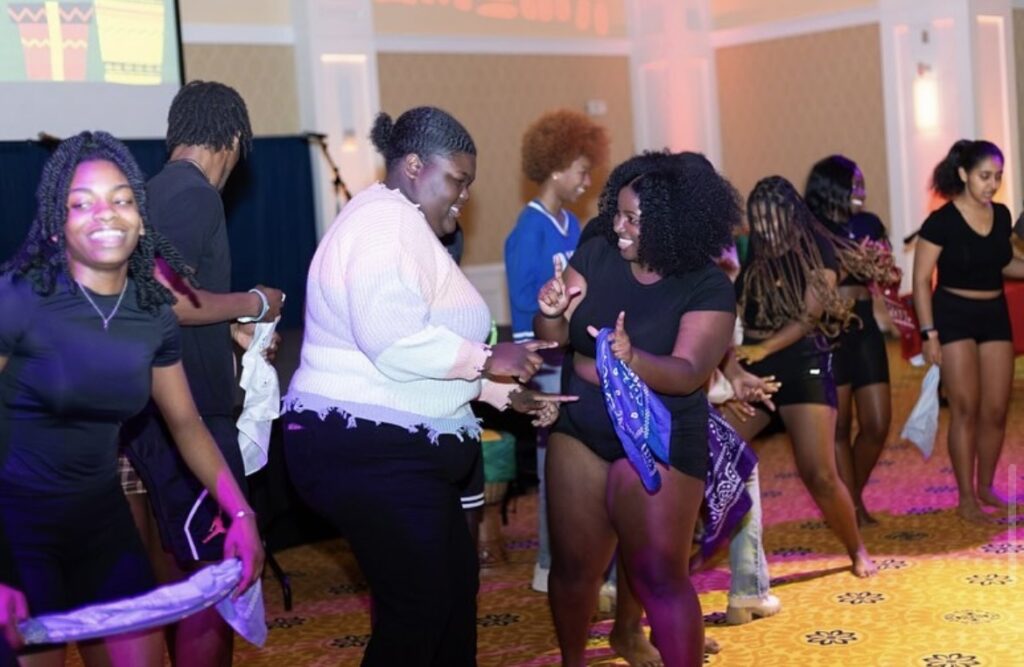A freshman’s perspective on student clubs
6 min read
Students attend the 2023 Kwanzaa celebration hosted by the UMW Black Student Association and James Farmer Multicultural Center in the Chandler Ballroom. | @umwbsa, Instagram
by EMMA KINGKEO
Staff Writer
Being a freshman is scary. Countless new students arrive on campus with few connections and little sense of belonging, and it can be intimidating to approach other people with the desire to make friends. So, how do newcomers find their people and integrate into the community?
UMW offers more than a hundred student organizations, and the majority of them are open and accepting of all students, regardless of major, year or identity. Joining any of these clubs can lead to enriching friendships and experiences.
As a freshman who graduated from a small high school, the thought of leaving my close-knit community terrified me. I knew almost all the students and staff there, and despite other colleges being relatively larger, Mary Washington was huge compared to what I was used to. Choosing a college that emphasized bonding between peers was very important to me, and it wasn’t until I came to campus and saw how people interacted with each other that I felt confident I made a good decision in coming here.
Clubs have been one of the most helpful resources in helping me meet like-minded people in small, intimate settings. Potential friendships are laid out on a silver platter, and I can be much more confident approaching others with the reassurance that everyone has something in common.
Academic Clubs
If students are having trouble maintaining their work-life balance, there are a variety of academic clubs that can help them socialize and keep up with their studies simultaneously. These clubs are also for students who aren’t planning to go into that specific career field but are interested in the subject or are curious about what it entails.
A multitude of these can be found specializing in subject areas such as the UMW Biology Club, UMW Art History Club and UMW English Club.
Katherine Allen, a junior anthropology major, joined the UMW International Relations Organization as a freshman because she was intrigued by the club’s special events and excursions.
“The reason I wanted to be involved in this club was because I heard that they traveled to go to different conferences, and I was super excited for that,” Allen said. Despite being an anthropology major, she is now the president of the club and describes the club to be “like a family.”
Many other academic clubs provide opportunities to go on field trips outside of campus to visit museums, seminars and gatherings to gain experience and promote learning.
Joining a club centered around studies has always seemed intimidating to me, mainly because I have never felt familiar enough with one subject to be able to connect with others over it. However, my apprehensions were immediately diminished once I got to experience how easygoing and encouraging these groups were. The atmosphere was invigorating rather than stifling because of the passion students have for the subject of interest. No matter the amount of knowledge they have, everyone was there to learn about something they loved and were willing to dedicate time to.
“A lot of people here, including myself, are naturally very reserved,” Allen said. “But here you’re able to open up in a way that you really couldn’t before.”
Cultural Clubs
Clubs dedicated to various cultures allow students to find connections through similar customs, food and music as well as promote understanding and awareness to the rest of the community.
As a member of the UMW Asian Student Association, I participate in and help with events that are reminiscent of my own life at home as an Asian American. During the Taste of Asia Celebration last November, I assisted with catering and was able to meet restaurant owners who spoke Lao—something that I had only been able to speak over the phone to family. Meeting them and engaging in conversation relieved a feeling of homesickness that I didn’t realize was plaguing me, and it wouldn’t have happened had I not volunteered. I plan to continue helping with events like these, such as the upcoming Lunar New Year Celebration on Saturday, Feb. 10.
Apart from the festivities that these clubs host, their meetings are beneficial to attend as well.
Leah Reaves, a junior with an undeclared major and the president of the UMW Black Student Association, described the club as a safe space for Black students to discuss culturally appropriate topics that involve them and inform others who are willing to learn.
“We want to make sure that as we get to talk about specific issues that happen, other people get to hear how we feel about it, how this impacts us, and what they can do as allies,” said Reaves.
Additionally, cultural clubs often collaborate by hosting events to enjoy large-scale, authentic festivities and entertainment. For example, BSA, UMW Women of Color and UMW Voices of Praise are working together with the James Farmer Multicultural Center during Black History Month to host more than 15 occasions commemorating African Americans and their contributions.
Athletic Clubs
Club sports are excellent for both former and current student-athletes as well as students who have no experience but are interested in staying active. Furthermore, all students can ensure that their studies and other obligations get adequate attention by participating in practices that are not exceedingly demanding.
For students who wish to continue or join an organized sport without the pressure of frequent competitions and mandatory practices, club sports offer the perfect balance. Such clubs include tennis, swimming and baseball.
While these clubs are dedicated to various sports, there are also athletic clubs that simply focus on maintaining or improving your physical health. One of these clubs is UMW Girl Gains, whose goal is to curate an uplifting fitness community through encouragement and inclusivity.
Like many others, I have been scared of going to the gym for fear of injury, embarrassment or simply feeling lost on how to get started. Girl Gains provides a network of people—open to all gender identities, despite the name—who are willing to help without judgment.
“Regardless of what you’re doing in your everyday life, we’re still here to support you no matter what,” said Lizzy Breckenridge, junior biomedical and German major and the community coordinator of UMW Girl Gains.
Personal Interest Clubs
Students searching for a community of like-minded individuals can look for student-led organizations that partake in their interests. Ranging from casual, sit-down activities such as crochet and gaming to performative hobbies like theatre and choir, there is something for everyone.
Personal interest clubs can be a breath of fresh air for those bogged down by schoolwork and other commitments. To name a few, the UMW Film Club, Tabletop Game Club and Gardening Club all provide students with opportunities to connect with peers over something they enjoy.
The UMW Performing Arts Company enabled me to continue dancing with other students and perform to a live audience. The club has allowed me to learn a variety of dance styles I have never tried and meet so many different people I never would have met otherwise.
Meanwhile, Fine Print—a club all about poetry—is another one of the clubs that gathers like-minded people around a particular interest.
Meaghan Van Dyke, a freshman whose love for poetry led her to become an officer for the club, said, “Being there among all my peers in Fine Print, it was just the most encouraging and welcoming community space for writing.”
“As an English major, you get to college and it can be very intimidating because it’s like nothing you’ve ever been part of before,” she continued. “So for me, Fine Print was a space that validated that I was supposed to be here.”










